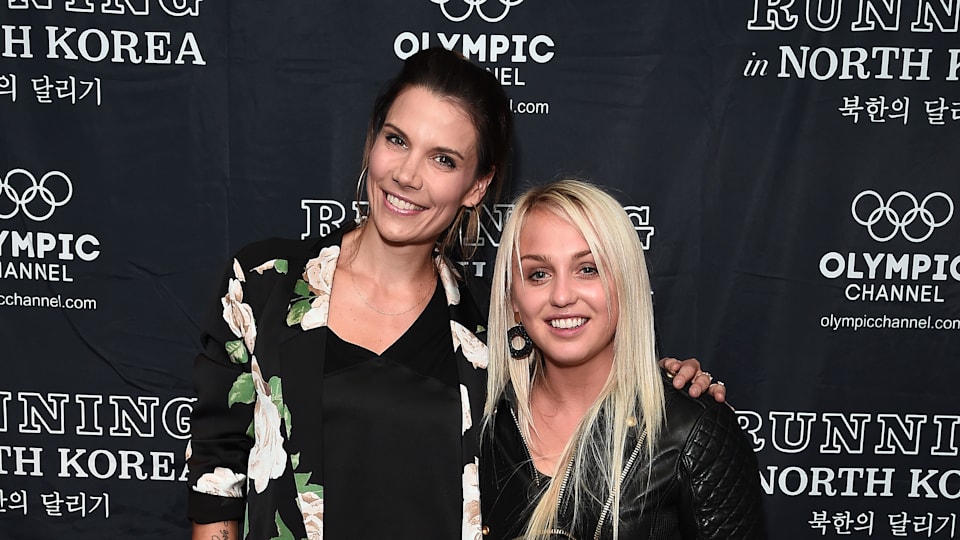Q&A: How 'Running in North Korea' documentary became a reality
From filming permission in the DPRK to casting Olympians Aimee Fuller and Mirjam Jaeger, Olympic Channel Director of Original Programming reveals film-making process

Olympic Channel original documentary Running in North Korea captures the journeys of Olympians Aimee Fuller and Mirjam Jaeger as they travel to Pyongyang to participate in the 2019 Mangyongdae Prize International Marathon.
Here, Director of Original Programming Greg Groggel reveals how the idea was turned into a reality.
How did the Olympic Channel gain access to North Korea?
The idea first came about in early 2017, but the timing made it impossible. With the Olympic Winter Games PyeongChang 2018 and the historic unified Korea team, the door really opened for the Democratic People’s Republic of Korea (DPRK) and the International Olympic Committee (IOC) to further collaborate. We sent a formal request to film the marathon to DPR Korea Olympic Committee President Guk Kim Il in October of 2018 and they accepted our proposal one month later.
What was their reaction?
I think the 2018 Olympic Winter Games had been a positive experience for the DPRK and they were eager to extend the goodwill. DPR Korea Olympic Committee Executive Secretary O Chol Min was our primary contact throughout all stages of planning. It took six months of formal letters, emails, applications and late-night phone calls from North Korea to put everything in place. I know they enjoyed having Aimee and Mimi as Olympic ambassadors and we hope they like the film.
How did you decide what to film?
The production team had a tightly-controlled itinerary that was agreed in advance with the DPR Korea Olympic Committee. We had requested to visit national training centres and meet North Korean athletes from a wide range of disciplines, which they accommodated. Some of the places we visited had never been documented by international media.
We made visits to the diving, table tennis, weightlifting and artistic gymnastics centres, and spoke with Olympic gold medallist Om Yun Chol and former marathon world champion Jong Song Ok, among others. Some of the other stops on the itinerary came at the suggestion of DPRK officials and the team was always chaperoned by an official.
Aimee and Mimi approached their visit with wide eyes, and it was understood that they were experiencing only a very curated window. But still, even a small glimpse into North Korean life is remarkable. We wanted them to use sport to try and forge new connections, and I think they more than succeeded in doing that.
Did the DPR Korea Olympic Committee censor any of the content?
There were some limitations in terms of what and how we could film while in Pyongyang. However, the Olympic Chanel had complete creative and editorial control over the final product, which was produced without any input or approval from DPRK officials.
How did you go about casting athletes to participate?
Olympic athletes are the Olympic Channel’s greatest strength, and we knew from the beginning that we wanted to have them at the heart of the film and experience everything first-hand, rather than take a more traditional approach to documenting the marathon.
We wanted to cast athletes who are curious, worldly and true ambassadors of the Olympic Movement – and both Aimee and Mimi perfectly fit that bill.
What were the Olympians' first reactions to the proposal?
Immediately intrigued – it’s not a call they receive often! But all of the Olympians we discussed the project with were excited to participate and eager to help demonstrate the power of sport in going to places where politics can’t.
In general, we benefit from an enormous level of trust as the media platform of the IOC. Only one athlete turned down the opportunity because of the destination itself – and that was because her mom wouldn’t let her go!
Were American athletes allowed to participate?
Our original plans did include the casting of a couple of additional American and international athletes. Unfortunately, the United States State Department would not support our request for special visas, so no Americans or US passport holders were allowed to travel to Pyongyang for this production.
Will the Olympic Channel return to Korea in 2020?
Anything is possible! We really hope audiences enjoy and share the film.
